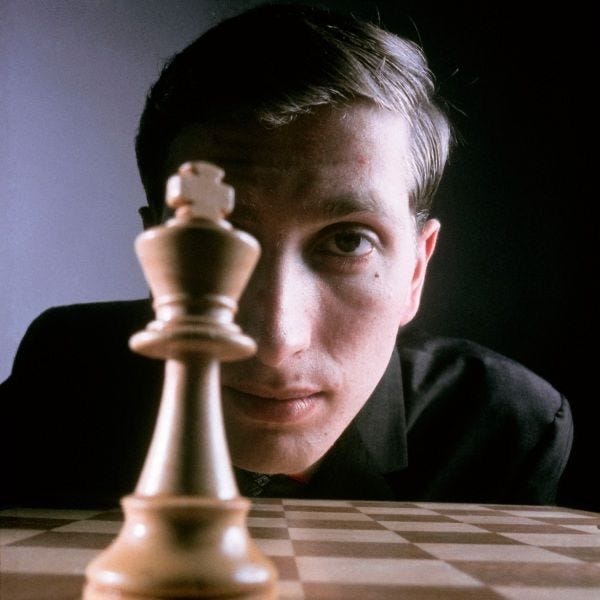It is always better to praise people for their effort, not their talent.
From The Laws of Human Nature.
Praising someone for their effort reinforces the idea that hard work and perseverance are the keys to success. This encourages a growth mindset, where individuals believe they can improve through effort and learning. While, Praising someone for their talent implies that their success is due to innate ability, which is largely out of their control. This can lead to a fixed mindset, where individuals believe their abilities are static and unchangeable.
Bobby Fischer
Bobby Fischer wasn’t just a great chess player, he was an obsession driven phenomenon. By the time he was 14, he had won the U.S. Chess Championship, and at 15, he became the youngest grandmaster in history. His IQ was reportedly over 180, and his ability to calculate complex positions was unmatched.
Fischer was single minded. Unlike other grandmasters who relied on coaches and teams, Fischer trained alone, often spending 14+ hours a day studying positions and games. He had a near photographic memory, recalling every move from decades old matches. In 1971, he crushed top Soviet grandmasters Mark Taimanov and Bent Larsen with a perfect 6-0 score in both matches. In 1972, he defeated Boris Spassky, the reigning World Champion, in a Cold War era match that transcended chess, turning Fischer into a global celebrity. Fischer wasn’t just winning, he was dominating the best in the world. And that became a problem.
After reaching the pinnacle, Fischer’s mindset shifted from improvement to protection. He refused to defend his title in 1975 against Anatoly Karpov. His list of demands for match conditions became increasingly unrealistic some argue this was a deliberate way to avoid playing. Instead of staying in competition, he disappeared from professional chess for 20 years.
Fischer's self image was tied to being the absolute best. But once you’re the best, any loss is a step down. Rather than risk losing, he avoided playing altogether. He never played another official match in his prime, despite being physically capable.
His fear of failure warped into conspiracy theories, he believed the Soviet chess world was rigged against him. He lived in exile, cut off from former friends, refusing to engage with the chess world. His only comeback was in 1992, in an unofficial rematch against Spassky. Though he won, he was a shadow of his former self.
Fischer’s downfall wasn’t physical or even technical it was psychological. His childhood praise as a chess genius created a fixed mindset, where failure became an existential threat. Instead of seeing chess as a skill to continuously refine, he saw winning as proof of his identity. Any risk of defeat threatened his sense of self, so he withdrew instead of improving. His genius became his prison, he would rather vanish than risk imperfection.
Had Fischer been encouraged to embrace growth and learning rather than just his raw talent, he might have stayed in competition and continued evolving like other grandmasters.
Keep reading with a 7-day free trial
Subscribe to Rgreenquote's Newsletter to keep reading this post and get 7 days of free access to the full post archives.



